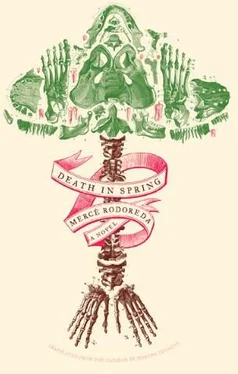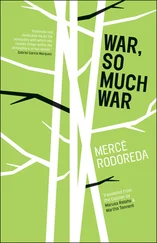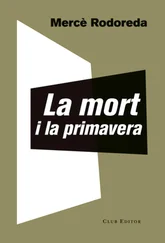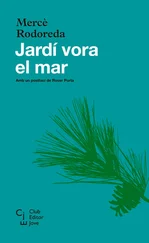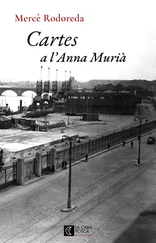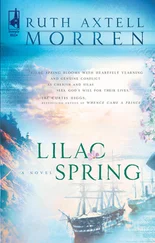We left the well. Outside, a gust of wind filled our eyes with earth, and we started walking, the wind bending us. When we reached the bottom, he said, you knew. Then we headed to Pedres Altes and sat on the sundial, contemplating the night. The following day he taught me how to make fire with two dry branches.
In a cave behind Pedres Altes lived the man with the cudgel. His palms were scarlet from swinging his cudgel on so many nights. The cudgel was his defense; he earned his living from it. He was old and no longer agreed to daily fights with boys from the village. The townspeople sent him boys one by one, and he received them, cudgel in hand. He was a tall man, taller than all of them. His hair was thinning, part-white, part-yellow. His toenails were like horse hooves: long and hard. Black. Because he walked through the manure pit near his cave to breathe in the stench, drawing strength from it. He had been trained in this manner since he was a child. To live patiently. A boy from the village awoke feeling brave one morning, wanting to devour sky and river, and asked to be allowed to fight the man with the cudgel. With his long, razor-sharp cane, the boy went in search of the old man, calling him out of his cave, challenging him, jumping and running about. The man emerged slowly, asked the lad what he wanted, knowing full well he wanted to battle; when the boy declared that he had come for combat, to defeat him, the man picked up the cudgel with both hands, lowered his head, and announced that they could begin. He opened his legs wide, planting himself firmly on both feet, and began to dodge the cane. Sometimes the cane grazed his skin, but he felt nothing. The combat continued until the boy fell to the ground, out of breath, half-dead, at which point, without even a glance at the lad, the man entered the cave to wait for night, when he would practice with his cudgel on the spot where the boy had fallen. The boy returned to the village a different person. If his blood had boiled before, now it had grown calm. He lived life better now than he had before. They said the man in the cave turned weak men strong. When he fought, he made a sort of shrill sound with his tongue, and his lips grew soft. When he came out at night to swing his cudgel in the air, he clamored for the poisonous river serpent to rise up, the mountains to flatten, man to die before birth. He would swing his cudgel from left to right, right to left, upward, then down, his body hardly moving. He controlled everything with his arms, they said, and with a look that rose from deep inside. He had lived in the cave for more than fifty years. Almost all the men in the village had endured the trial of the cudgel. They took him food and manure — silently, so as not to wake him if he were asleep.
The blacksmith’s son said he wanted to visit the man with the cudgel. We left the child asleep on top of the stone clock and circled Pedres Altes. At the entrance to the cave stood a clearing surrounded by high grass and shrubs. We caught sight of him right away, straight as a tree, swinging the cudgel above his head. He was uttering things we couldn’t understand because he spoke in a low voice, but we caught the word round and the word wind . They said patience had made him strong, the patience to live a life swinging his shiny cudgel — shiny from being held so often — and defeating the village boys. While we watched him, he swung the cudgel from side to side at shoulder level; then slowly he stooped to knee level. If any legs had been within reach, he would have smashed them. We saw him stop and enter the cave, by this time his body bent from weariness, as if putting aside the cudgel had made him instantly grow old, his backbone soft. Not many boys from the village wanted to fight him. The elderly said that all the good things were fast vanishing.
I found myself alone. The blacksmith’s son had disappeared; I didn’t hear him leave. The night had been clear, but clouds began to form, and a diaphanous fog rose above the river and remained there. While I was gazing at it, suddenly — without my realizing it — the blacksmith’s son appeared at my side again, telling me we had to hurry. I’ve taken the old man’s cudgel and hidden it in the shrubs; let’s leave before he notices. I think it was that very morning that I went down to the river to look for cane. The blacksmith’s son had collected my daughter and taken her home. The fog didn’t dare thicken; its drowsiness put the water to sleep. I headed to the Festa esplanade. It wasn’t yet dawn, but a brighter ribbon of light gleamed from the sun side, and I was thinking about the man with the cudgel and how it had turned his palms scarlet, as if they were covered in blood.
By the esplanade the river vaulted underground, creating a wave; but the water by the canes was calm. I sat down on a bench, my arms on the table, my head on my arms. I shut my eyes as if I were dead. I was dead. I would have stayed there all my life, until the wind scattered my dust. I could envisage my body, no longer flesh, turning first into sulphur dust that caught on the underside of bees, then into earth, and finally breathing new life into flowers. Once my existence unraveled, it became death and flew about; from spring to spring only winter’s death would live. All of me was weighted down. As I was feeling the weight, I heard a splash and raised my head. Rings had formed in the water, giving birth to other rings, as if someone had hurled a flat rock. The rings kept spreading until they reached the point where they died. The days-old water was green on the opposite bank, where I had watched the Festa years before. When all the rings stopped, I glimpsed a hand by the canes. A hand above the water, as if supported from below, tiny and white and flat like a fearless spider. The hand rose, then fell furiously, striking the water. I approached the canes and hid. I caught sight of a girl who climbed out of the water and got dressed; she reappeared from behind the canes, tucking her bodice into her skirt, her back to me, the hem of her skirt almost grazing my knee. Her feet were pale. And the lower part of her legs. Her heels were rose-colored, like the pink houses in spring. When the bodice was tucked in, she took a few steps, stopped, looked at the sky, then dashed back to the water she had just abandoned and began waving her hand from one side to the other as she blew away the illusion of fog that wasn’t really there. Just a bit of smoke. She returned to where she had been standing, but faced me this time and, raising her arms, she grasped her hair with both hands, pulled it up and tied it. As she lifted her arms, her bodice again escaped her skirt, and again she tucked it in. At that moment, without giving it a thought, without wanting to, I got to my feet. We looked at each other. She stood in front of me, her hands still raised, I in front of her. Both of us standing. Eye to eye, mouth to mouth, our hearts troubled. Not wanting to, not thinking, I stretched out my open hand, wishing to touch her because she was alive, yet wondering if she was real. As if I had passed on to her the wish to do what I had done, she extended her arm toward me, her hand open. That was enough. The two of us standing, our fingertips on the verge of touching, barely separated by what might have been the thickness of a leaf. We remained like that as the morning mist grew thinner, as if the water in the middle of the river had swallowed it, instead of spitting it out. And she departed. I stood there with my hand outstretched. I jumped with a start when her hair abruptly came loose and fell like sudden night down her back. You, you are a hand, the blacksmith’s son had told me. I stepped forward, placing my feet on the water spots she had left on the ground and pressed the soles of my feet as hard as I could against the earth, my body weightless. Her short, wet hair, was swept up, away from her neck. This is what I most remembered about her, before her hair fell loose. All the women in the village have long, fine hair. Her husband takes hold of her hair, a strand of which dangles free. I felt the birth of desire as I had never felt it, desire alone, violent and solitary as a rock. Look at them, their eyes like horses’, never knowing when they live, when they die.
Читать дальше
